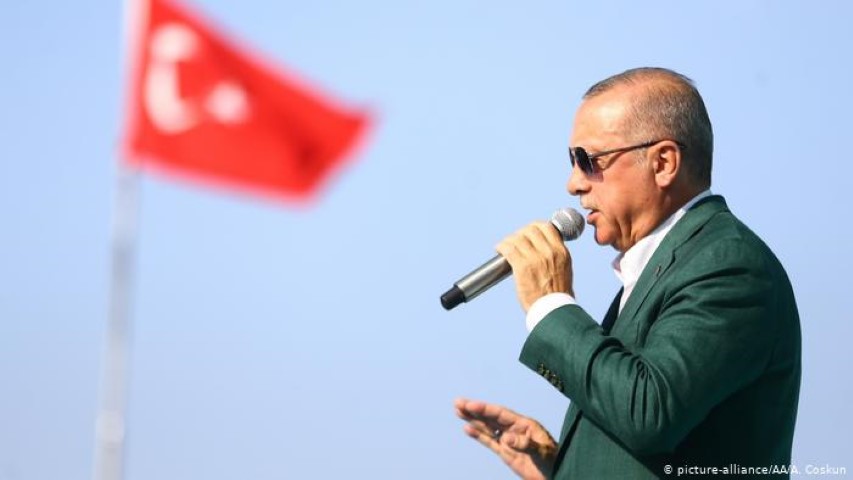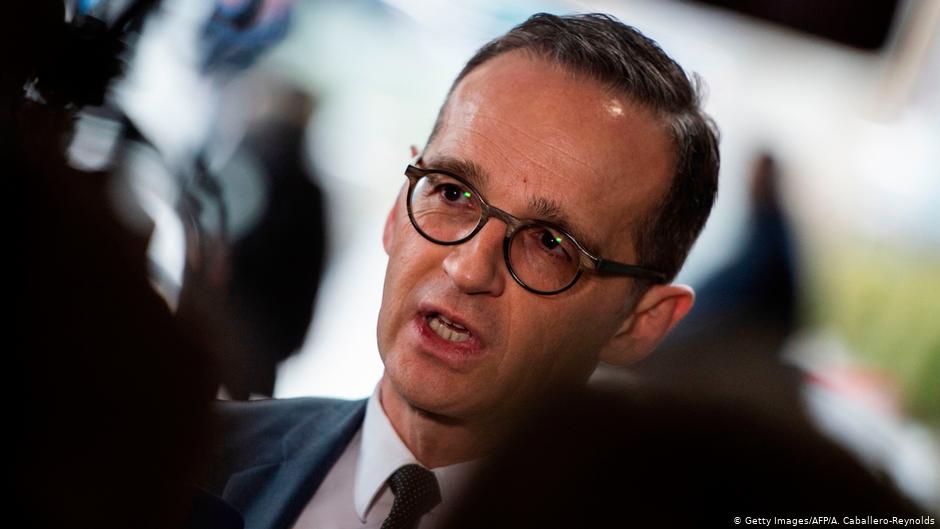Erdogan's captive audience

For some Turkish citizens, hearing Erdoganˈs Operation Peace Spring being perceived as an act of aggression and labelled as an invasion by Western and Arab League observers has proved deeply frustrating. Because for them, it was an anti-terror campaign that had to be carried out.
The Turkish army began its incursion into northern Syria, together with Turkish-backed Syrian groups, on 9 October, saying it wanted to establish a ʺsafe zoneʺ, clear the border of the People’s Protection Units (YPG) and pave way for the return of millions of Syrian refugees. The operation was paused eight days later, all the while receiving support from, or at least the approval of, the majority of Turkish society, as noted by many observers.
One of those observers, political scientist Professor Tanju Tosun was at pains to emphasise that no empirical data existed to measure this approval or the level of it, but the dominant sentiment indicated that there was ongoing public support. "The operation has had something of a calming effect on domestic politics. There has been a break in the polarisation and tension between the government and opposition," he told Qantara.
Despite their criticism of the AK Party’s foreign policy, Tosun continued, the main opposition Republican People’s Party (CHP) and nationalist IYI Party preferred to throw their support behind the ruling Justice and Development Party (AK Party) over national interests.
ʺThere may well be differences in opinion, however, between the party functionaries and grassroots voters. It is also likely that the centre-right and the centre-left of Turkey do not support the operation at the same level and to the same extent. I think the more liberal segments of Turkish society who are more connected with the outer world view the issue from an international law and relations perspective, while the more nationalist elements tend to be more supportive,” Tosun said.
You may also like: Not-so-splendid isolation – Erdogan's geopolitical nightmare
Brooking no opposition
He pointed out that the Peoples’ Democratic Party (HDP), which draws most of its support from the Kurdish-majority areas of Turkey, was the only political party represented in parliament to come out against the operation. Accused of ʺmaking propaganda for a terrorist organisationʺ and ʺopenly degrading the Turkish Republic,ʺ HDP co-chairs Sezai Temelli and Pervin Buldan are already under investigation for their open criticism of Peace Spring.
They are not the only ones. Turkish police have launched legal action against more than 100 people for ʺinciting hatred through a smear campaignʺ, including the editors-in-chief of two separate opposition media outlets and Sezgin Tanrikulu, a CHP deputy and former head of Diyarbakirˈs bar association.
Meanwhile, the head of the Turkish Bar Association, Metin Feyzioglu, has come under fire from some of his colleagues for comments he made on a TV show referring to Turkeyˈs incursion. He asserted that if a state is under attack by a group that is using civilians as human shields, the state does not have a responsibility to protect the lives of those civilians. The immediate controversy was short-lived, however. Feyzioglu followed up on this remark with another opinion reflective of the dominant public sentiment about the operation, and the wider issue.
He said that those ʺnot condemningʺ the outlawed Kurdistan Workers’ Party (PKK) even ʺhalf-heartedlyʺ were effectively criticising Turkey. The PKK is listed as a terrorist organisation by the U.S. and the EU. And Ankara says its extension in Syria, the YPG, is a threat with which the U.S. has partnered in its fight against Islamic State.
Widespread public opinion tends to reflect Feyziogluˈs view. For nationalists, adopting such a stance means being deliberately against Turkey, with some even claiming that this view masks a deep-seated desire to destroy Turkey.
Resentment towards Europe
Liberals, on the other hand, say the outrage among the international community stems from selfishness or ignorance on the issue. Journalist and commentator Murat Yetkin told independent media outlet Medyascope that Western countries were acting as if there was stability in Syria and that Turkey’s operation was compromising this stability. He declared the only concern of European countries was to prevent refugees who might potentially flee the region from reaching Europe.

Turkish citizens would agree with this. They believe that the EU is not sharing the burden of refugees enough. Turkish authorities have said one aim of the operation is to ensure the safe return of Syrian refugees to their home country. This is one of the main reasons why the public has overwhelmingly approved the operation. Bearing the economic, financial and political problems of 3.5 million refugees is not easy for any country, and most Turks feel they have been abandoned on the issue by the West.
A survey carried out in July by poll company Ipsos revealed that 59 percent of Turks want the borders to be closed to refugees.
On the other hand, there is also the matter of sending back mainly Arab Syrian refugees to a ʺsafe zoneʺ that is to be created in mostly Kurdish-populated areas. Dr. Vahap Cosakun, an academic from Dicle University’s law faculty, says that this is becoming an unsettling issue for some citizens, particularly Turkeyʹs own Kurdish population. ʺSuch discourse feeds into the idea that Turkey is following an anti-Kurdish policy. It is getting difficult to counter this impression,ʺ he said.
You may also like: The Turkish-Kurdish conflict – Friend and foe
While another key aim of the operation is to clear the Turkish border of the YPG, many people in Turkey decried the fact that Western media coverage and tweets by U.S. President Donald Trump portrayed the operation as a war between Turks and Kurds.
Western media’s reference to YPG fighters as merely Kurds and the presentation of the operation as an aggressive act against Kurdish civilians has deepened popular frustration in Turkey. The lack of coverage in Western media of certain aspects, such as the official ideology of the entity in northern Syria controlled by the YPG, amounts to ʺAposimʺ, a term that derives its name from jailed PKK leader Abdullah Ocalan.
It is no secret that the YPG is led by former European head of the PKK and Ocalanʹs adopted son Sahin Cilo, who received a phone call from and was praised as 'General Muslim' by Trump. This sympathy generated mass disappointment in the Turkish media and public.[embed:render:embedded:node:37648]
Nevertheless, as Tosun underlines, such vague discourse, which fails to differentiate between the YPG and Kurds, is also something Turkey uses to its advantage – an issue that has the potential to foment anti-Kurdish sentiment within its own borders. "The state must do something to prevent such tension," he said.
Turks are also irritated by accusations toward their state regarding Islamic State. After all, Turkey has also lost its fair share of citizens to attacks carried out by IS. As a result, many Turks feel their trust in the is West eroding, which naturally feeds into the nationalist discourse that ʹTurks have no friends but Turks.ʹ
There are also some people, however, who believe this sense of isolation reflects the current situation in Turkey. Yildiray Ugur, a columnist for independent media outlet Serbestiyet, writes that Ankaraʹs failure to communicate effectively is related to mistakes it has made: the setbacks in democracy, the lack of press freedom, and the deterioration in the rule of law have all weakened Turkey’s chances of making a convincing case.
Ayse Karabat
© Qantara.de 2019
